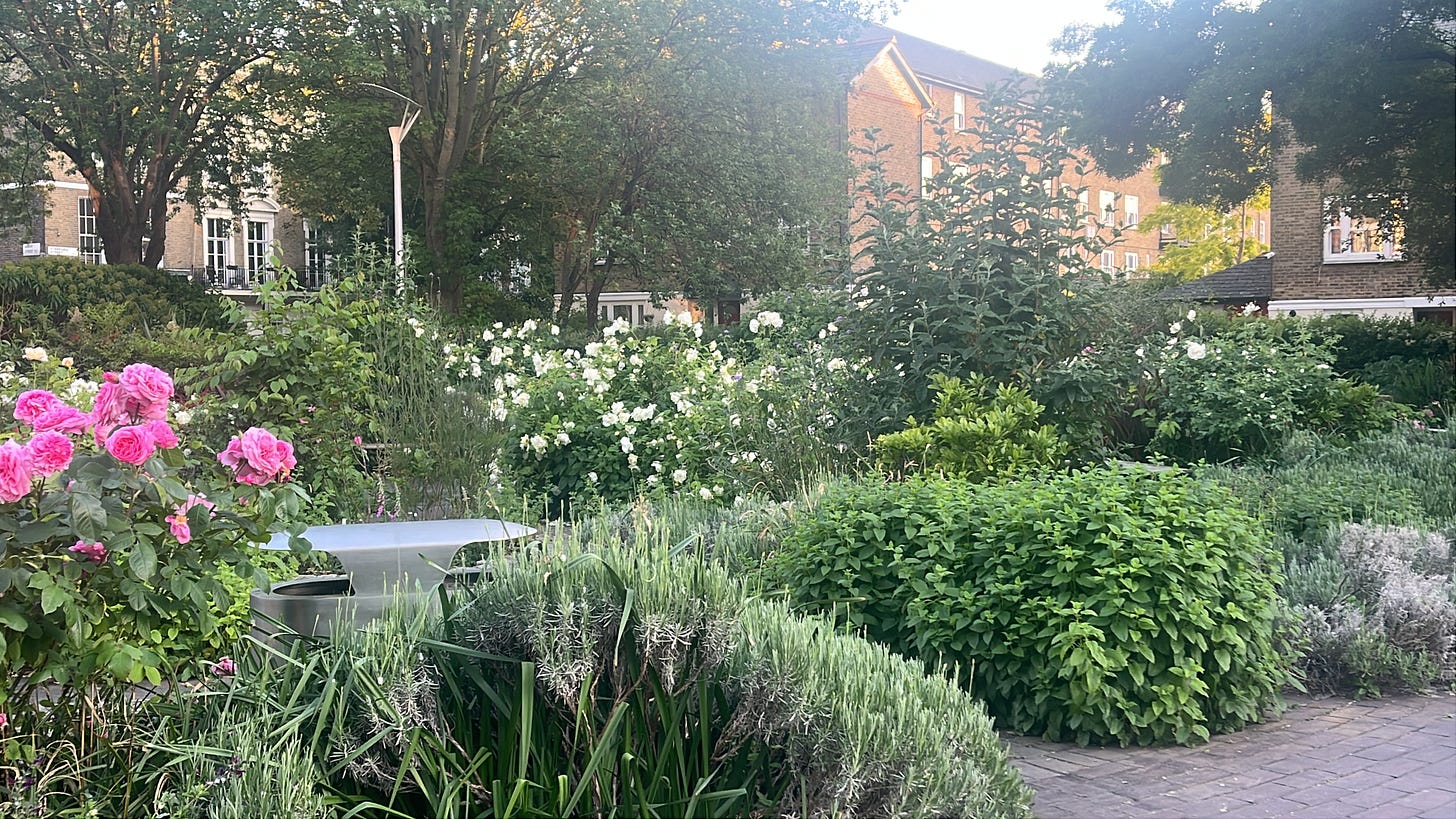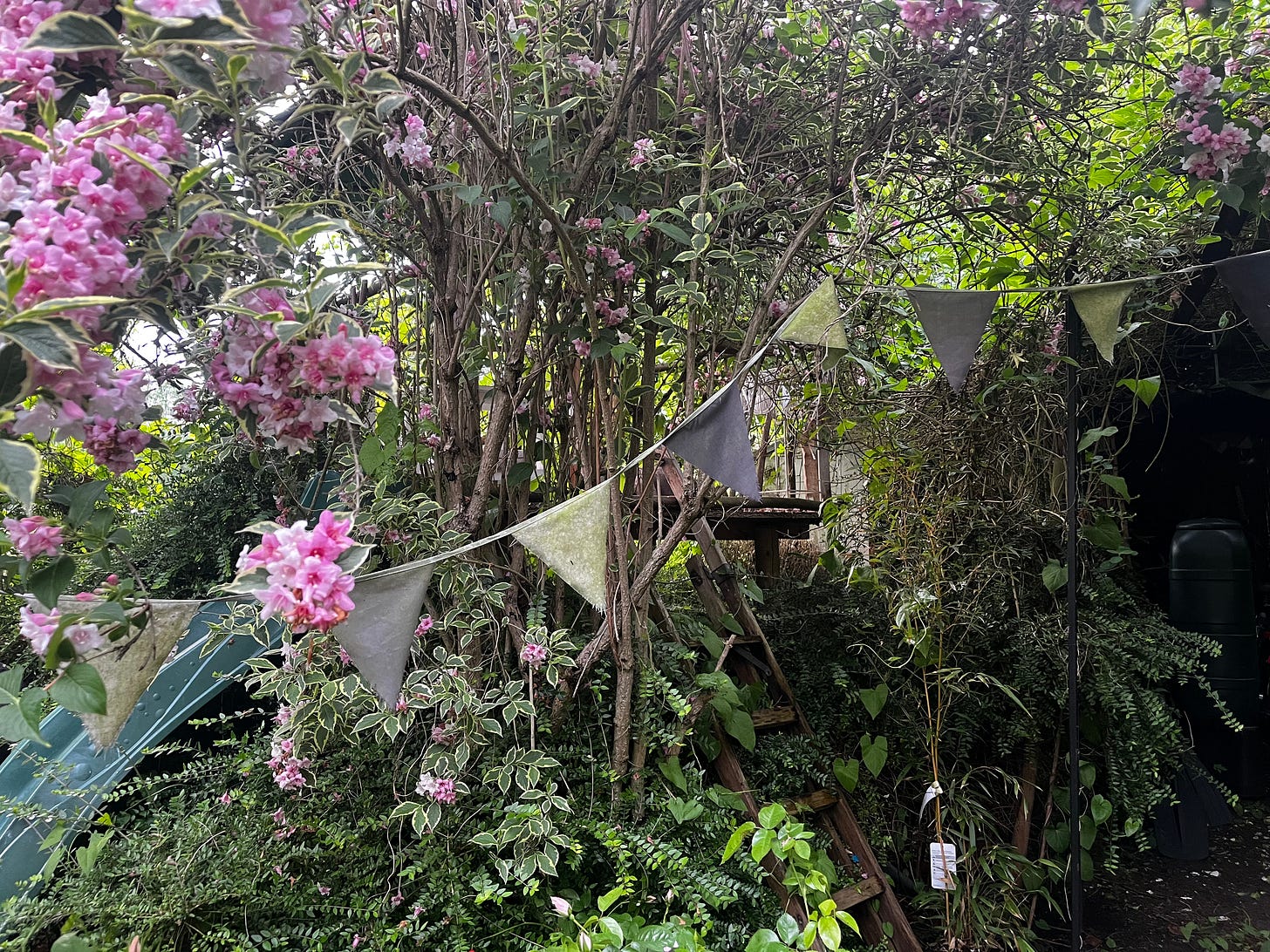Notes on caring spaces
Some reflections on the care, containers and the conditions for change.
Recently in London while wandering around South Bank, I came across a hidden enclave, the Bernie Spain Gardens, tucked between housing estates and office buildings. A tiny oasis of fragrant and well-tended English roses and pollinator flowers, I learned the space is owned, managed and maintained by Coin Street. Per signage, “The Gardens are named after local resident and founder member of the Coin Street Action Group, Bernadette Spain (1936-84). Bernie epitomised the motto of her school – ‘Women in time to come will do much‘. After training as a clinical psychologist, she worked tirelessly to challenge inequality in health and housing. Bernie’s work with the Coin Street Action Group in the 70s and 80s changed the entire fate and face of the area in which she lived.”
While spending a week running an intensive “Becoming Guides” sprint for a group of brilliant and brave climate finance warriors, I kept coming back to these gardens each evening. I was moved not only by the abundance of flourishing rose bushes, but by the underlying intention of the space. I felt it, even without the signage. I would sit on the stone bench encircling the roses or walk the gardens slowly, watch the bees, and simply breathe while the sounds of traffic echoed beyond.

We often talk about the importance of relationships in our lives that foster care, belonging and mattering. What about our experiences being in spaces and places that are imbued with care and concern, that feel themselves healing as a result of the beings who created, tended and fostered them?

At this time of intensity and necessary for skillful action, we benefit from turning our attention to the conditions that most support and enable skillful ways of being. And, as you may know by now, I draw inspiration from worlds of neuroscience, clinical psychology and trauma-informed work. I look at what actually works in lived, real life contexts.
I keep coming back to what seems to be a precious and rare commodity in our workplaces, our advocacy, our organizations, our leadership teams and boards, our councils and our steering committees.
And that is having the space, and time to reflect. To process.
To felt cared for, and held enough to feel that one is not alone, but woven into a fabric of caring humans and beings that extend across time and space.
We can do this in our workplaces, in our climate and environmental work — and it’s now a necessity.

I have written about the necessity to create a new kind of psychology for our times of existential threat today.
This psychology is one that is integrative, grounded, and flexible to account for the rapidly shifting grounds under our feet. It is trauma-informed, as we are in trauma-infused times. (And have been of course always, but this is a new flavor at new speed and scale.) We — especially those with influence and resources — cannot afford to draw on old and outdated theories of change right now, rooted in binary and reductive thinking from a previous era. We owe ourselves and those past, present and future, to do the due diligence of forging a new kind of psychology that enables those working on the frontlines of system change. Whether it’s at the community grassroots level, or the highest elite altitudes.
Doing this requires the humility— which itself requires a kind of psychological strength — to accept we must evolve, we must grow, we must unlearn and turn towards those who may have some insights to unlock action at scale.
These insights are (too) buried and hidden in the worlds of clinical and trauma-informed psychology. They are practiced by individuals who have training to hold spaces, and understand team and organizational dynamics. They are informed by those who have direct experience with facilitation and mediation; who really get the psychology of social change. For anyone who says “we don’t have time,” is not exercising imagination and the innovative mindset that we need right now.
I am trying to understand (and have been for 30 years) why the climate and biodiversity/ecological movements are not availing of these resources at speed and scale. Why do we continue to focus on a blinked approach to solutions, as if reflection is not the precursor to skillful action. (Yes: neuroscience.)
Related to the necessity of new strategic, political and tactical approaches informed by trauma-informed practices, is the fundamental role of curators and conveners right now — something I shared widely last year in the Notes on So-Called Impact Gatherings.
This is because of a very simple truth: When humans occupy spaces of care and intention, and feel “held” by a good container (facilitators, organizers and conveners, I am looking at you), amazing things happen.
We access our ingenuity, our foresight.
We can reflect long enough to sensemake into effective response.
We move from reactivity to responsiveness.
Organizations — private, public, educational, etc. — are NOW needed to step up, evolve their identities and model the leadership of a Guide — that foregrounds the function of convening people in conversations, collaboration, bridge building and sensemaking. Organizations that host, bring together, and have the courage to invest in building the necessary capacities.
And guess what? It requires, you got it — humility. Leadership that says, “I don’t know but my instinct tells me it’s time to bring people together, to ditch the old ossified ways of working that don’t fit with our times.
It requires a bold and clear leadership, what I call Guiding. A leadership that doesn’t “bring people along” (I hate that phrase!) as much as come alongside and invite, evoke and point the way. A leadership that knows how to unleash collective intelligence and unlock human capacity.
A leadership that is psychologically literate, trauma-informed and understands that each of us need to be listened to, heard, understood and respected, to bring out our best and highest selves.
The skillsets involved happen to be the ones I have shared in the Guiding Principles of Guiding. They are:
And guess what? You can learn more about this on the Project InsideOut site. This is the basis of many workshops, trainings and soon to come …. a public offering! Stay tuned for more news here on that.
Talking, talking, talking
We are again heading into that season of forums, summits, gatherings and conferences. How often are these activations taking into account what happens before, during and after the events? Are the conveners and curators taking responsibility to ensure it’s a productive and effective use of resources, time and human capacities?
Read the piece from last year which is, indeed, just as relevant then as it is now. Full of advice and best practices, this piece asks us to be smart and strategic about our resources when we gather for so-called impact. And take risks in how we connect, foster trust, and slow down enough to go fast when it counts.
What if we designed our events and gatherings so that people left feeling energized, rather than exhausted and depleted?
What if we designed more for connection, and less for “content”?
What if we enabled spaces in our convenings, from 100 to 10,000, that actually cultivated the conditions for intimacy?
What if we had open, safe and explicit dialogues about our respective theories of change? Rather than pushing for our own, at every opportunity?
I enjoyed being part of the lively Debatable format produced by Kite Insights, lead by the brilliant Sophie Lambin, and getting to meet co-debaters colleagues as Dr. Heba Aguib, Adélaïde Charlier, and Dr. Isabelle Ferreras!

Updates on my book, THE CHANGEMAKER CODE
Following on my announcement last month about my astonishing book deal with VIKING PENGUIN RANDOM HOUSE (woohoo) I am now setting about the task of actually writing the book. Many of you have asked for details. The book is scheduled to be out in early 2027. It will be full of stories, interviews and research about the psychology of being a next-level changemaker, what I also call “Guiding.”
I am also psyched to share I have signed with The Lavin Agency! As you know, public speaking of one of my very favorite ways to share this work. I’m looking forward to many stages and groups to come.
How can you support this endeavor?
While I received an advance, I am actively raising funds to support my capacity to take the time and space necessary to write this book. Here are ways you can help:
Donate to my mom’s care fund. Currently I am dedicating about 2.5k a month towards her care (with dementia). If you contribute, this helps relieve financial pressures that can free up my time to write. If I can cover this for 6 months, it would be incredible.
Recommend or refer me to writing retreats / residencies, or grants / fellowships.
Reach out to people who may be inspired to ‘sponsor’ my work, who recognize the reach and impact this book is set to have globally for helping people channel their care for the world.
Subscribe to this Substack at annual rate of 7/month or 70/year.
Thanks for reading, following and sharing.
While I took a bit of haitus this past Spring due to book and work travel and activities, I will be back in the flow starting July.
With care,
Renée
Podcasts!
Manda Scott and I covered some amazing ground in her Accidental Gods podcast. I was so thrilled to be in this convo with Manda and have had lots of feedback on this piece. Check it out here.
The amazing Ellen Weinreb had me on her podcast! Check out this great convo here.
Eva Frye and I talked climate comms, the secret to unlocking behavior change and more in her Climate Shifted podcast, a truly excellent resource for the discerning climate leader. Find it here.
Listening to this:






